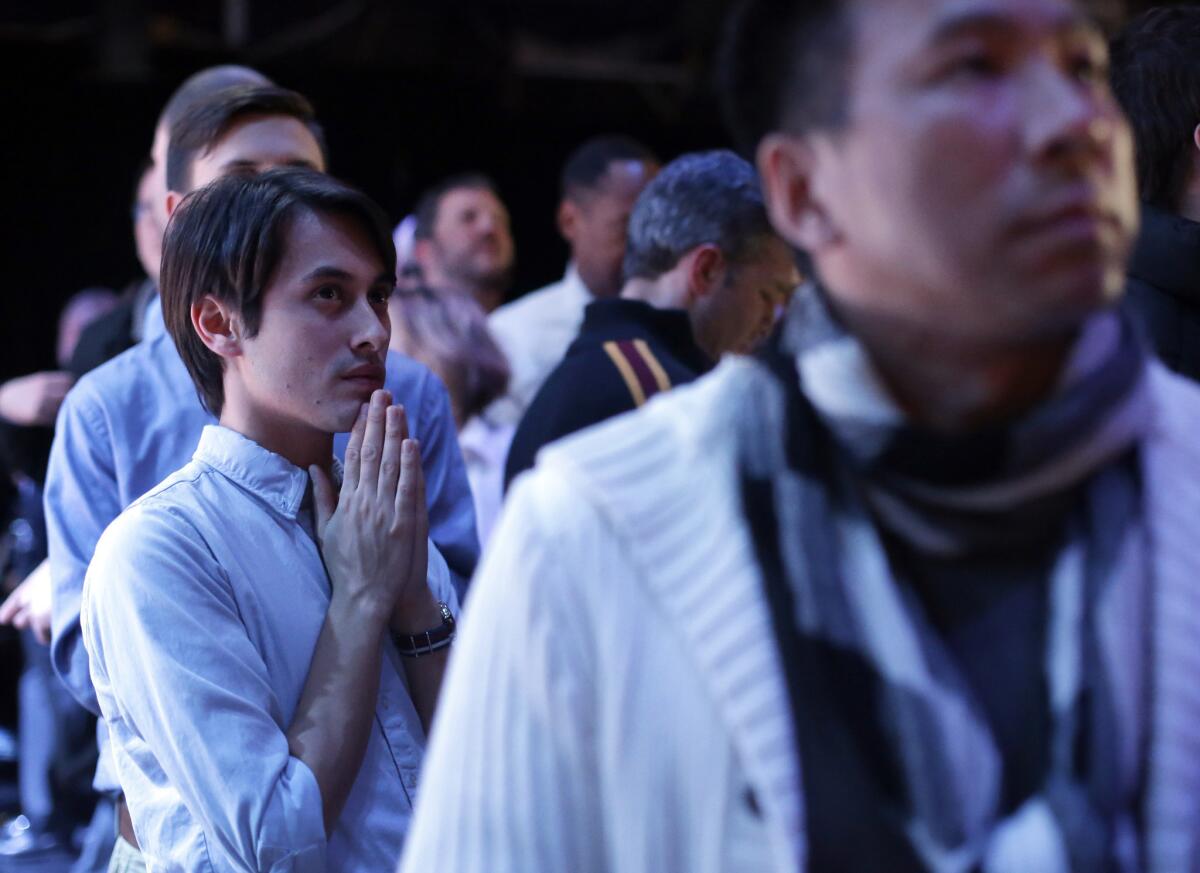Same-sex marriage measures passing in Maryland and Maine

- Share via
CLEVELAND — Maryland and Maine appeared poised to become the first states in the nation to back same-sex marriage at the ballot box Tuesday night, and other gay-marriage measures were on the ballot in Minnesota and Washington.
The issue had been before voters 32 times and had been rejected every time. But activists say public opinion has shifted since 2008, when California passed a constitutional amendment reserving marriage for heterosexual couples. A 2010 poll showed that, for the first time, more Americans supported gay marriage than opposed it, and in May, President Obama endorsed same-sex marriage.
A win in any of the four states would suggest that momentum is on the side of gay marriage activists, said Fred Sainzo, a spokesman at the Human Rights Campaign, a gay rights group that has donated $5 million to gay marriage proponents in the four states.
LIVE: Presidential election results
“If Obama is reelected and if we pass two or three of these state ballot initiatives, this is good, solid momentum on behalf of equality,” he said. “It shows that Americans are willing to support equality at the ballot box.”
But those who believe marriage should be between one man and one woman dispute that.
“These are really specific states,” said Frank Schuberto, a California consultant who is running the anti-gay-marriage campaigns in the four states. “The fact that an uber-liberal state like Maine or Washington might go for same-sex marriage, it doesn’t mean that the country has changed.”
Even if Minnesota voters side with gay-rights advocates, same-sex marriage will remain illegal there because of an existing law. The current measure, Amendment 1, seeks to put a same-sex marriage ban into the state’s constitution. With 29% of precincts reporting, just over 50% of voters opposed the amendment.
Maine’s initiative had been thought to have the best chance to pass. Question 1 asks voters to allow Maine to issue marriage licenses to same-sex couples.
Just three years ago, the state defeated a same-sex marriage bill at the ballot box. But a lengthy campaign to change voters’ minds has persuaded some Mainers, said David Farmer, spokesman for Mainers United for Marriage.
PHOTOS: America goes to the polls
“We’re optimistic. We’ve had more than 250,000 one-on-one conversations with people; we are confident that those personal connections have worked to move folks,” he said earlier. Polls released in the days leading up to the election showed that 50.5% to 55% of Mainers planned to vote yes. With 37% of precincts reporting late Tuesday, Question 1 held a slim lead. The Associated Press predicted that it would pass.
Polls had indicated that Maryland and Washington were toss-ups. In both states, the Legislature passed and a Democratic governor signed a bill allowing same-sex marriage. And in both states, opponents collected enough signatures for a referendum on the law, putting it on hold in the meantime.
With about 80% of precincts reporting, Maryland’s referendum to uphold the law held a sizable lead -- putting Maryland on track to become the first state below the Mason-Dixon line to legalize gay marriage.
Washington voters — as well as those in Colorado and Oregon — also were weighing in on legalizing marijuana. Recent polls showed Washington’s Amendment 502 and Colorado’s Amendment 64 with a chance to win, but Oregon’s Measure 80 lagging. Early results from Colorado showed the measure with a slim margin.
Gay marriage is legal in the District of Columbia and six states — Vermont, Connecticut, Iowa, Massachusetts, New Hampshire and New York. But 30 states have constitutional amendments prohibiting it and 11 more have laws banning it. A study released last month by Third Way, a moderate think tank, showed that support for gay marriage had risen 16 percentage points since 2004.
Still, for some voters, this election seems eerily similar to 2008, when Obama was running for president and an anti-gay marriage initiative was on the California ballot. Obama won, but so did Proposition 8, which overruled a state Supreme Court decision and added an amendment to the state constitution defining marriage as between one man and one woman.
In 2010, a federal judge rejected Proposition 8, but his ruling is on hold pending appeal.
Los Angeles TV writer Jen Braeden, 32, remembers the disappointment of 2008 and is wary about the referendum in her home state of Maryland. Braeden, who lives with her girlfriend of three years, says she would like to wed if same-sex marriage becomes legal in Maryland, but isn’t ready to get her hopes up.
“I definitely think things are changing. In 30 years, this will be a non-issue, like interracial marriage,” she said. “But national opinion is changing slowly, and as of right now, I don’t know if we’re there yet.”
Braeden said she was concerned about the presidential election as well, fearful that a Mitt Romney-Paul Ryan administration would make things even harder for gay and lesbian couples.
Same-sex marriage advocates have outspent their opponents nearly 3 to 1, pouring $32.7 million into the campaigns, to foes’ $11.3 million.
The fight will continue after election day. Lawmakers are prepared to introduce bills protecting same-sex marriage in the legislatures of Illinois, Delaware, Rhode Island and Hawaii.
“People on both sides feel strongly about what marriage is,” said Schubert, the campaign consultant. “From our perspective, it doesn’t matter what a state decides to call a relationship. We’ll continue to have this argument regardless.”
Follow Politics Now on Twitter and Facebook
More to Read
Sign up for Essential California
The most important California stories and recommendations in your inbox every morning.
You may occasionally receive promotional content from the Los Angeles Times.











